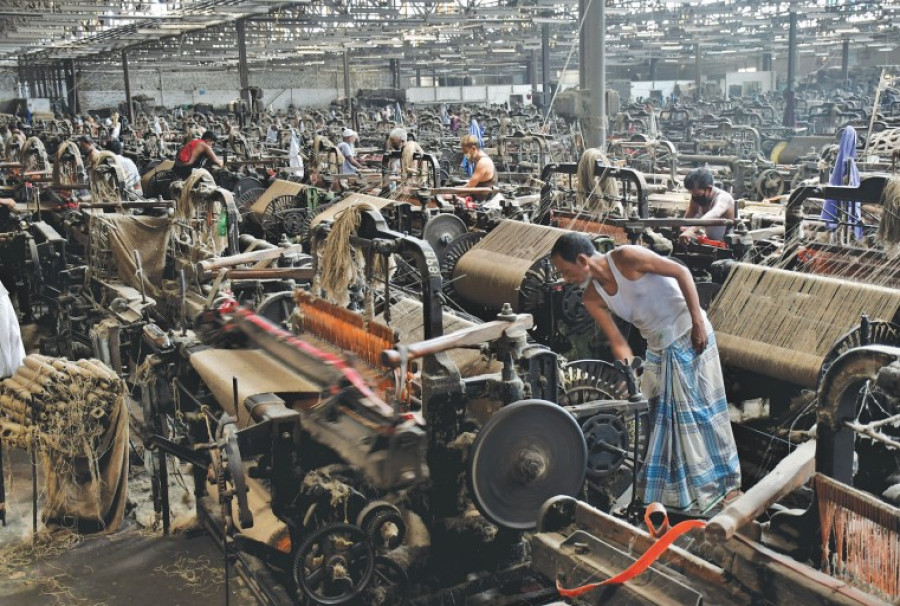Money
Exporters rue Indian anti-dumping charges on Nepali jute products
Until two decades ago, Nepal used to produce 80,000 tonnes of jute annually. Production has now plunged to 10,000 tonnes.
Binod Bhandari
India, Nepal's key trading partner, has been reluctant to remove the anti-dumping charges levied on Nepali readymade jute products, which has been hurting exports for a long time, according to traders in eastern Nepal.
An anti-dumping duty is a protectionist tariff that a domestic government imposes on foreign imports that it believes are priced below fair market value.
Nearly a year ago, Prime Minister Pushpa Kamal Dahal, during his visit to India requested the Indian prime minister to remove anti-dumping charges on Nepali readymade jute products.
According to them, after the issue was raised, the Indian side had also informed them of conducting a study and tabling it at the secretary-level meeting of the two countries to remove the charges.
A year has passed, but nothing happened, traders lamented.
Previously, India had imposed a 12.5 percent countervailing duty on Nepali readymade jute products. It removed the countervailing duty, but later imposed 2 to 4 percent anti-dumping charges on the Nepali readymade jute products.
India has been imposing anti-dumping charges for the last seven years.
“India has not imposed anti-dumping charges on Bangladesh,” said Raj Kumar Golchha, president of the Jute Industry Association. “With India imposing anti-dumping charges on Nepal, it has affected exports. The higher charges have made it difficult for the Nepali jute products to compete in the Indian market.”
Other than jute products, India has been imposing anti-dumping charges on other products too, said Ramesh Rathi, vice-president of the association.
Nepali jute factories have been importing up to 70 percent of raw jute from India and Bangladesh and exporting readymade goods to India.
Nepal is exporting hessian jute cloth, jute thread and bags to India. With India imposing 2 to 4 percent anti-dumping charges on these goods Nepali jute exporters are paying a charge of Rs300 million annually to India.
The jute industry is one of the key employment-generating sectors in the Sunsari Morang Industrial Corridor. Currently, 12,000 people are engaged in producing jute products.
Until a decade ago, there were around 12 jute factories in the Sunsari Morang Industrial Corridor. Half of them have been shut down due to an unfavourable environment.
According to the Directorate of Agricultural Development in the Koshi province, 20 years ago, jute was cultivated in 40,000 hectares in Morang district alone. Now, that has shrunk to 5,070 hectares.
In Sunsari and Jhapa, jute farms covered 20,000 hectares and 10,000 hectares, respectively.
Now, they have shrunk to 1,300 hectares and 550 hectares, respectively.
Until two decades ago, Nepal used to produce 80,000 tonnes of jute annually, but this has plunged to 10,000 tonnes now, according to the directorate.
Along with the Indian anti-dumping charges, Nepali jute industry is not getting cash incentives promised by the Nepal government which has made the industry suffer.
The export of jute products has declined by 7 percent in the first eight months of the current fiscal year ended in mid-March.
According to the Trade and Export Promotion Center, Nepal exported jute products worth Rs4.97 billion in the first eight months of the current fiscal year, which is a decline from Rs5.86 billion in the same period last fiscal year.
Nepal exported jute products worth Rs7.64 billion in the last fiscal year 2022-23.
The export of jute contributed 4.94 percent of the total export share.
Jute entrepreneurs said the decline in exports is mainly due to the Indian anti-dumping charges and Nepal’s failure to provide attractive incentives to exporters.
Two years ago, the government removed the 70 percent subsidy on electricity provided to jute industries and decided to give 5 percent cash incentives (based on export value). Earlier the incentive was 3 percent.
“On top of the Indian anti-dumping charges, the Nepal government still has not provided the promised cash incentives. Both of these are responsible for the shrinkage in the industry and exports,” Golchha said.
The demand for jute products is low due to the global economic slowdown, Golchha said. “In the last fiscal year, we exported jute products of Rs7 billion, but this year the export could dwindle to Rs5 billion,” he said.
With the start of the current fiscal year in mid-July, Nepal rolled out the Nepal Trade Integrated Strategy (NTIS) 2023 by greatly expanding the list of promising export products and services from 12 to 32. The NTIS 2023 has also listed jute products as one of the export-oriented products.
Until three decades ago, Nepal was a major jute exporter to Europe. The crop was one of the major sources of foreign exchange.
Insiders say the industry started to disintegrate after the government became indifferent towards its growth.




 10.12°C Kathmandu
10.12°C Kathmandu














